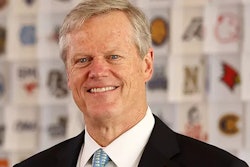When California recently became the first state to officially outlaw use of the term “Redskin” for mascots throughout the state, it again sparked conversation over the use of Native imagery and likenesses in sport—from amateur to collegiate to professional.
Gyasi Ross, an author and speaker who hails from the Blackfeet Nation and Suquamish Nation, says, “When you’re talking about mascots or prohibited words … it is always about power and/or access.
“It’s the portrait of privilege when [Washington football owner] Dan Snyder says, ‘This is how you’re supposed to feel about’” his team’s persistent use of the word. “Because our ancestors suffered for that history and had faithfulness to survive that history. … Far be it for any person not of that family, not of that tribe, not of that community to have an opinion on this.”
“The origin of the word comes from the historical context. It was published in newspapers in the west—placing bounties on Native [people], using the R-word. So how can it be thought of as being anything but derogatory and a hate word?” asks Robert Holden, deputy director of the National Congress of American Indians.
Holden’s NCAI colleague, legislative associate Brian Howard, agrees. Pointing out that many of the Native representations in collegiate and professional sports sprung up “in the early 1900s, when a lot of the perception by the general populace toward Native Americans was that we were a dying race, in terms of actual numbers and as concerted efforts to try to assimilate Native peoples into mainstream society and to do away with” the idea of sovereign nations and cultures, he says. Howard notes that the argument that the names are intended to honor, not offend, are flawed.
Ross challenges where the line of acceptability is drawn by the non-Native majority in this country. “If ‘Redskins’ is an inappropriate title, then we shouldn’t use any Native names,” he suggests.
Holden agrees, saying, “I would like to do away with all of them. They’re all derogatory, they use caricatures and they all use the things that Native people use as part of our culture. … Eagle feathers within Native communities and societies [are] given for doing good things for the community, for their families … and for warriors who faced death defending our homelands, so these are things that are not taken lightly.”














